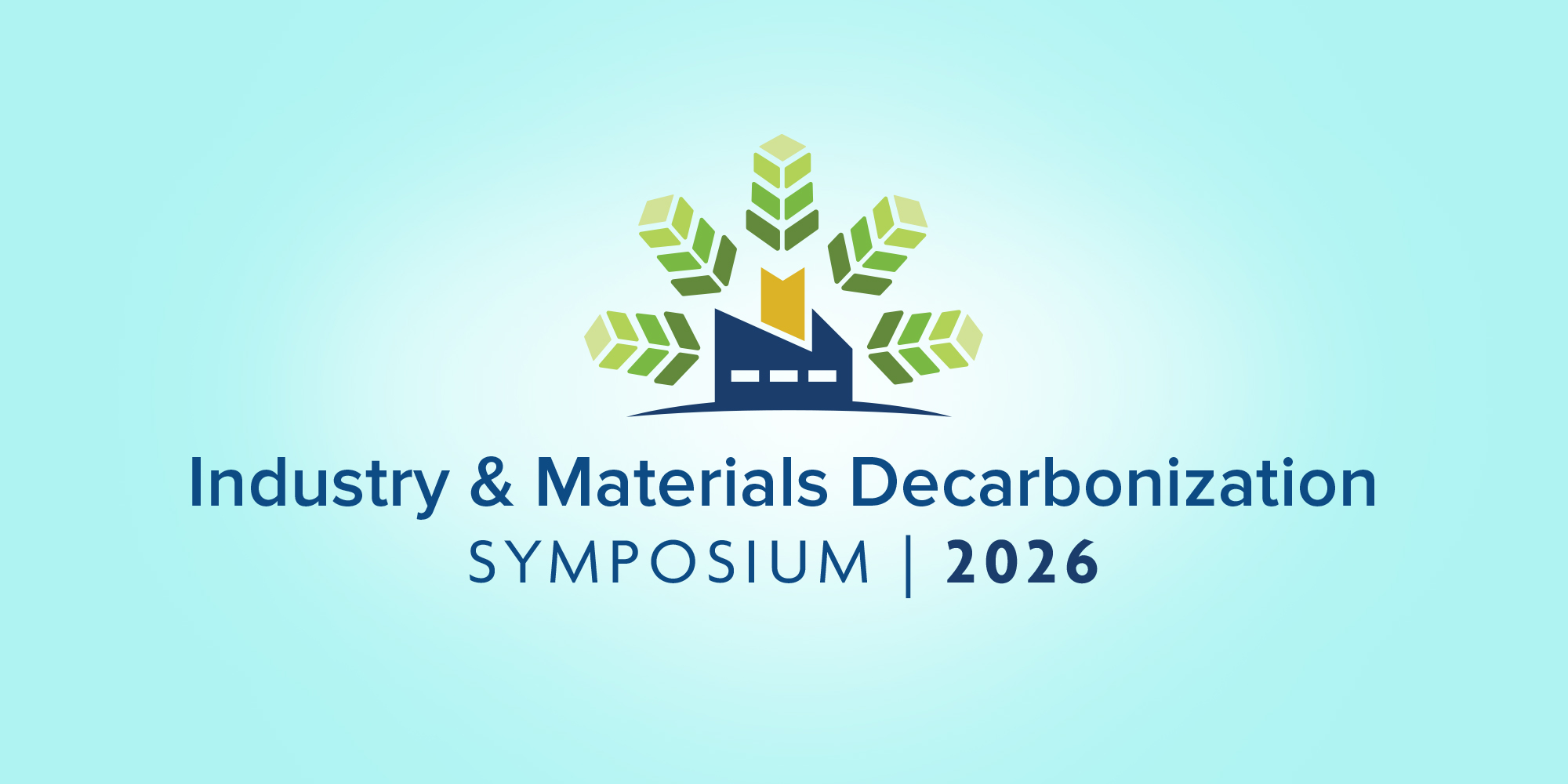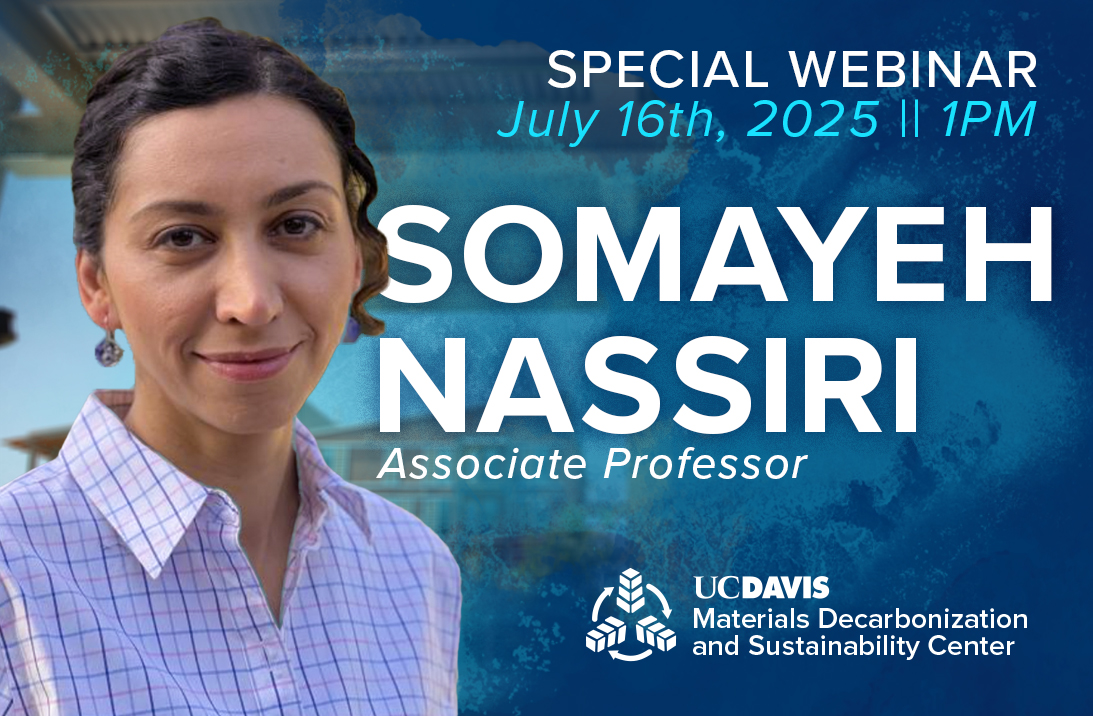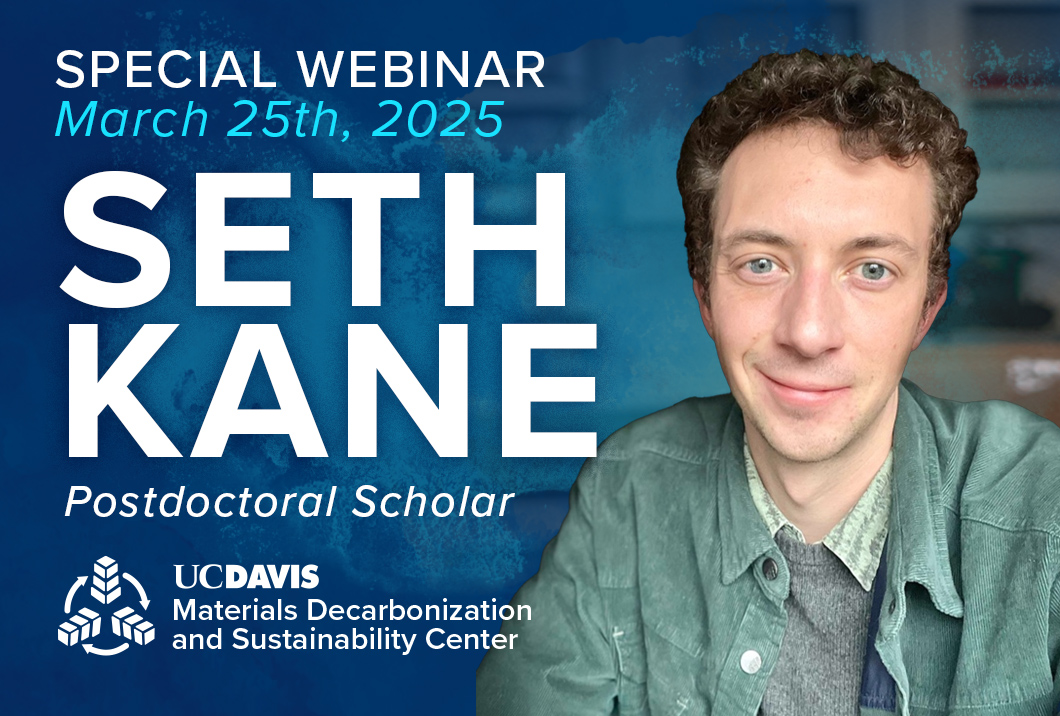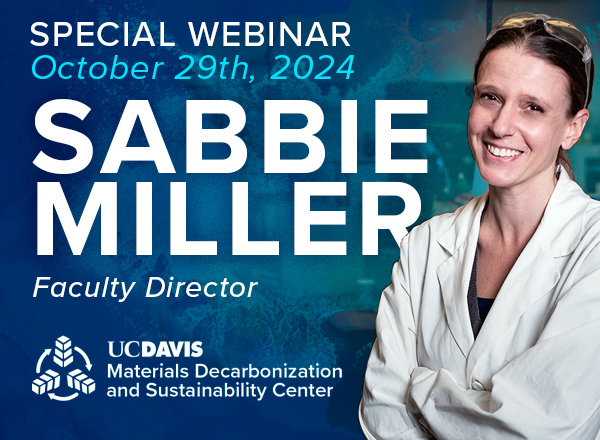Events
April 16, 2026 | UC Davis Conference Center
Registration is now open. Advance registration is required.
Please join us for the UC Davis Industry & Materials Decarbonization Symposium, a free in-person event focused on the technical, policy, and deployment challenges of decarbonizing industrial systems and materials production. The symposium is jointly led by the UC Davis Industrial Decarbonization Solutions Hub and the UC Davis Materials Decarbonization and Sustainability Center, reflecting the interconnected role of energy systems and materials across the full decarbonization landscape.
Industry and manufacturing account for a significant share of global greenhouse gas emissions. Addressing these emissions requires coordinated advances in energy efficiency, electrification, process innovation, materials design, life-cycle assessment, and policy frameworks. This symposium brings together participants working across industry, academia, government, utilities, and related technical fields to examine these challenges and share perspectives on pathways forward.
The Industrial Decarbonization Solutions Hub advances practical, scalable approaches to reducing industrial emissions through applied research, technology deployment, and decision-support tools. Its work spans industrial energy efficiency, electrified thermal systems, industrial heat pumps, load flexibility, grid interaction, and analysis of emissions drivers across U.S. manufacturing and electricity systems. The Hub is directed by Kelly Kissock, Faculty Director of the UC Davis Energy and Efficiency Institute.
The Materials Decarbonization and Sustainability Center focuses on decarbonizing and reducing other environmental burdens tied to materials production through a full life-cycle lens. Its research addresses materials production, embodied carbon, novel materials development, policy and economic mechanisms, and the environmental and community impacts of materials supply chains. The Center is directed by Professor Sabbie Miller of Civil and Environmental Engineering at UC Davis.
Symposium Structure
The symposium will feature opening and closing plenary sessions that frame key policy, programmatic, and market drivers shaping industrial and materials decarbonization. The day will also include parallel breakout sessions organized around sector-specific and technical themes, along with poster sessions and informal discussion. An evening networking reception will provide additional opportunities for exchange across disciplines and organizations.
Who Should Attend
The symposium is intended for:
- Industry practitioners and facility operators
- Technology developers and solution providers
- Utilities and energy program administrators
- Policymakers and regulatory staff
- Academic researchers and graduate students
What to Expect
Participants can expect technical discussion grounded in current research and real-world deployment experience. Topics will span industrial energy systems, materials production, life-cycle impacts, policy and economic drivers, and strategies for accelerating adoption of low-carbon solutions. A detailed agenda and speaker information will be posted as plans are finalized.
Tuesday, December 9th, 2025 | 1:00 – 2:00 pm
Josefine Olsson, PhD Candidate, UC Davis Civil & Environmental Engineering
Concrete is an essential material in the built environment and plays a critical role in infrastructure and urban development. Recent estimates have put global concrete production as contributing approximately 8% of anthropogenic CO2 emissions annually. The manufacturing of cement, the hydraulic binder that binds rocks together in concrete, is the main source of CO2 emissions from concrete. To mitigate GHG emissions from concrete, strategies need to be adopted along the full life cycle, i.e., from selection of raw materials, cement manufacturing, material and structural design to end-of-life management.
This webinar will present: (1) an investigation of the cumulative global influence of several GHG emissions mitigation strategies over the concrete life cycle, including improved cement manufacturing efficiency, cement substitution by supplementary cementitious materials (SCMs), structural design efficiency, and design for enhanced durability and longer lasting concrete structures; (2) an investigation of the future demand and availability of resources to be used as SCMs to produce low-carbon concrete within the United States, and (3) a framework for a performance-based sustainability evaluation of alternative concrete mixture designs. Cumulatively, the work presented can be used to provide researchers, engineers, concrete producers as well as policymakers with a reliable decision-support tool and bridge the gap between stakeholders’ efforts to decarbonize the concrete sector.
Josefine Olsson is a PhD candidate in Civil & Environmental Engineering at UC Davis. She studies GHG emission mitigation pathways for low-carbon concrete production and the life cycle assessment of cement and concrete and has a background in structural design. Josefine will start a position as a postdoctoral scholar at the Lawrence Berkeley National Lab in January.
Wednesday, July 16th, 2025 | 1:00 – 2:00 pm
Somayeh Nassiri, Associate Professor of UC Davis and Principal Investigator at the University of California Pavement Research Center
Lab2Slab2Practice presents a comprehensive risk management framework for accelerating the adoption of low-carbon concrete into standard practice based on systematic evaluation. The framework draws upon social behavioral models, including Kotter’s 8-Step Change Model, Diffusion of Innovations (DOI), and the Unified Theory of Acceptance and Use of Technology (UTAUT) to help identify and manage risks. These methods help to guide the novel technology integration process by addressing early adopters, building performance expectancy, reducing perceived user effort, leveraging social influence, and facilitating conditions.
By reliable, fast throughput experimentation at laboratory and slab scales, engaging all stakeholders, the framework aims to manage risks related to performance, scalability, and environmental impact, and reduce the adoption timeline for low-carbon materials from over 10 years to fewer years. Ultimately, this approach aims to institutionalize low-carbon concrete into state departments of transportation's specifications and building codes, thereby contributing to significant reductions in greenhouse gas emissions in infrastructure projects.
Somayeh Nassiri is a faculty member at the UC Pavement Research Center (UCPRC). She is interested in pavement materials and structural design techniques to improve pavement sustainability. These strategies include using more sustainable materials and construction practices for long-lasting and durable pavements. Others are to improve pavement structural design for new and rehabilitation projects and to optimize repair jobs in terms of materials, timing, and construction to extend the life cycle of pavements, among others. Dr. Nassiri teaches courses on the materials, design, repair, rehabilitation, and management of asphalt and concrete pavements.
Tuesday, March 25th, 2025 | 1:00 - 2:00 pm
Seth Kane, Postdoctoral Scholar, UC Davis Materials Decarbonization and Sustainability Center
Global materials production, as of 2019, exceeded 42.8 Gt and was responsible for over 25% of global anthropogenic greenhouse gas emissions. Simultaneously, global forestry and agriculture resulted in 9 Gt of underutilized biomass residues. The utilization of these residues in materials production represents a key pathway to reducing the burdens of materials production, creating long-term storage of atmospheric carbon, and meeting society’s material demands. There is also a growing and competing demand for biomass residues for energy production.
This seminar will discuss viable pathways to utilize biomass residues in concrete, steel, plastics, and other materials in the context of global material production, biomass residue availability, biomass properties, and material performance changes. We will highlight the role that biomass residues can play in existing roadmaps for industrial decarbonization of key materials, by informing robust supply chains using local resources and identifying hotspots to prioritize industrial and policy solutions.
Dr. Seth Kane studies sustainable materials and carbon sequestration in the built environment, with goals of emissions reductions and mitigation of damage to heavily impacted communities. His work encompasses materials (including polymer, cementitious, biomass, carbon, and composite) and technologies (including pyrolysis, additive manufacturing, alternative recycling, and energy storage) and is inspired by his first-hand experience with how a warming climate impacts both the natural and built environments, having grown up in interior Alaska. Dr. Kane completed his PhD in Mechanical Engineering with a Materials Science focus at Montana State University and is currently a postdoctoral scholar at UC Davis, focusing on industrial ecology in Civil & Environmental Engineering.
Tuesday, October 29th, 2024 | 1:00 - 2:00 pm
Sabbie Miller, Faculty Director, UC Davis Materials Decarbonization and Sustainability Center
Materials like plastics generate high emissions during production due to energy-intensive processes, while others, such as cement and concrete, have high emissions largely due to their massive scale of consumption in construction. This seminar will provide a primer on key drivers for these and other materials, which contribute disproportionately to global emissions. We will explore the specific emission challenges associated with four key materials—cement/concrete, steel, plastics, and bricks—and discuss the unique obstacles and opportunities for decarbonization in each. Attendees will gain insight into technological, policy, and design innovations that can help reduce the carbon footprint of these essential materials.





